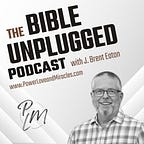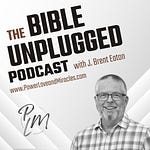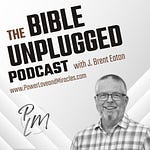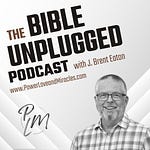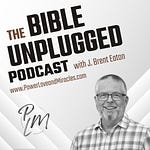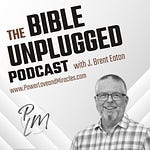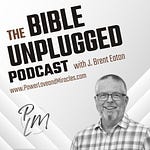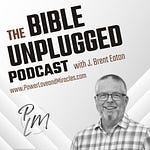Introduction
• Have you ever experienced a loss to painful that you feel you have lost your direction and future? If you have, God has a message of hope for you. The pain of grief and loss can slowly transform into a sense of hope and the confidence that God is on your side.
• I’m Brent, and this is episode 44 of The Bible Unplugged. We begin a 4-part series on people in the Bible who experienced grief and how God showed His grace and love in the middle of the pain. If you know someone who needs this message, please feel free to share these episodes with them.
• Please take a minute to look at the show notes for this episode at PowerLoveandMiracles.com under the Podcast tab.
Naomi’s Story
• In this episode we look at Naomi, one of the central figures in the Book of Ruth. These events took place in the time of the judges of Israel. It was an era of moral confusion and instability that threatened the existence of the nation.
• The Book of Ruth opens with a famine in that caused Naomi and her husband Elimelech and their two sons, Mahlon and Chilion, to move from Bethlehem to Moab. It’s ironic that “Bethlehem” means “house of bread” in Hebrew.
• Within a short time, Elimelech died leaving Naomi a widow. The two sons married women from Moab, Orpah and Ruth. About 10 years later, Mahlon and Chilion died. Naomi was now without family and without any means of support. Widows at that time had no inheritance and depended on charity from others to survive.
• Naomi planned to go back to Bethlehem and send her daughters-in-law back to their families. While Orpah and Ruth offered to stay with Naomi only Ruth went with her.
• Naomi had encouraged Ruth to go back home, but Ruth’s reply is something we often hear in a wedding ceremony. The Book of Ruth chapter 1:16-17 Ruth said, “Don’t urge me to leave you, and to return from following you, for where you go, I will go; and where you stay, I will stay. Your people will be my people, and your God my God. Where you die, I will die, and there I will be buried.”
• When Naomi and Ruth arrived in Bethlehem, the people there were excited to see them. Naomi, though, told them, “Don’t call me Naomi. Call me Mara, for the Almighty has dealt very bitterly with me. I went out full, and Yahweh has brought me home again empty. Why do you call me Naomi, since Yahweh has testified against me, and the Almighty has afflicted me?”
• The word “mara” in Hebrew means “bitter” and we can understand why Naomi felt that way.
• She was so immersed in her grief that she believed her life would not get better.
• Naomi wasn’t aware that God had already started a process to help her. Ruth, who stayed by Naomi’s side, committed to finding a means of support for both of them.
• The rest of the story unfolds quietly.
• Ruth follows after the farmers to pick up leftover grain in the fields to provide for them. It was a common practice in that time to allow the poor to gather up grain leftover from the harvest.
• In doing so, she caught the attention of Boaz, a relative of Elimelech.
• Boaz shows kindness and protection. He instructed his helpers to leave a little extra in the fields for her and to be sure she was safe.
• Eventually, Boaz married Ruth through a complicated process called levirate marriage. This restored Naomi’s family line and provided support for her and for Ruth.
• I encourage you to read at least chapters 3 and 4 to see the sophisticated process involved in arranging Ruth’s marriage to Boaz. There’s a lot of conniving and planning on both sides of the relationship.
• Ruth gives birth to Obed, who was the grandfather of King David.
• In a beautiful twist in the story, the women of Bethlehem tell Naomi, that Ruth is more valuable than seven sons would have been.
What Do We Learn from This?
• We find the grief experience of Naomi to be like our own today. In the middle of pain and loss we may feel that God has abandoned us, and we have no hope. What we learn is that God is already at work for our good even when we may not see it. God was already moving:
• In Ruth’s loyalty in spite of her own grief
• In Boaz’s kindness and love toward Ruth
• In the reward of continuing ordinary work. Ruth’s gleaning to find food led to her marriage to Boaz.
• More importantly, God was at work in the birth of Ruth’s child who would be part of the Messianic line of Jesus.
• We also learn that God works beyond our expectation and understanding. Naomi’s grief was cancelled, erased, and more than equally compensated. God’s movement led to Naomi’s redemption. God doesn’t always remove the pain, but He does transform the meaning.
What Do We Do with This?
• When you experiences grief and loss, trust that God is already at work for your good. Watch for subtle signs that God is moving. It may be the words someone says, a surprisingly beautiful sunset, or a passage of Scripture you read with a whole new meaning.
• Ask yourself: who is my Ruth? Who in my life is helping me to see God working in my loss and pain. Other people you counted on may have fallen away, but God sends someone to help us through the difficult times.
• Is there someone who needs your care and support? If you have experienced a painful loss, God has prepared you to be a “Ruth” to someone in the middle of their own helplessness.
• Naomi’s story reminds us that bitterness doesn’t disqualify us from God’s blessing. God is never as far away as He seems.
The conclusion
• Yes, the music means this is the end of this episode. But I’ll be back with more soon.
• I hope this has been helpful. If so, take a second to give this podcast a high rating and share it with someone who feels the pain and bitterness that grief and loss can bring.
• I invite you to check out my devotional book “In the Presence… 31 Days of Experiencing God in All You Do.” You can find more information at PowerLoveandMiracles.com or search for the book on Amazon.
• In the next episode, we focus on the experience of Hannah in the Book of 1 Samuel. She learned that God hears and responds to prayers of pain and emptiness that we may not be able to voice ourselves.
• My prayer for you is that you will experience God’s actions in your life even before you know the end of the story.
• Have a blessed week.
The disclaimers
• Just to let you know
• All opinions are my own. If you agree, keep listening. If you don’t… keep listening, I might surprise you with something you didn’t know.
• All Bible quotations come from the World English Bible which is a public domain work.
• Our show theme song is “Awesome Call” by Kevin MacLeod and is available under a Creative Commons license.
• The content of this podcast is copyrighted 2025 by J. Brent Eaton
• This has been a Power Love and Miracles production.

